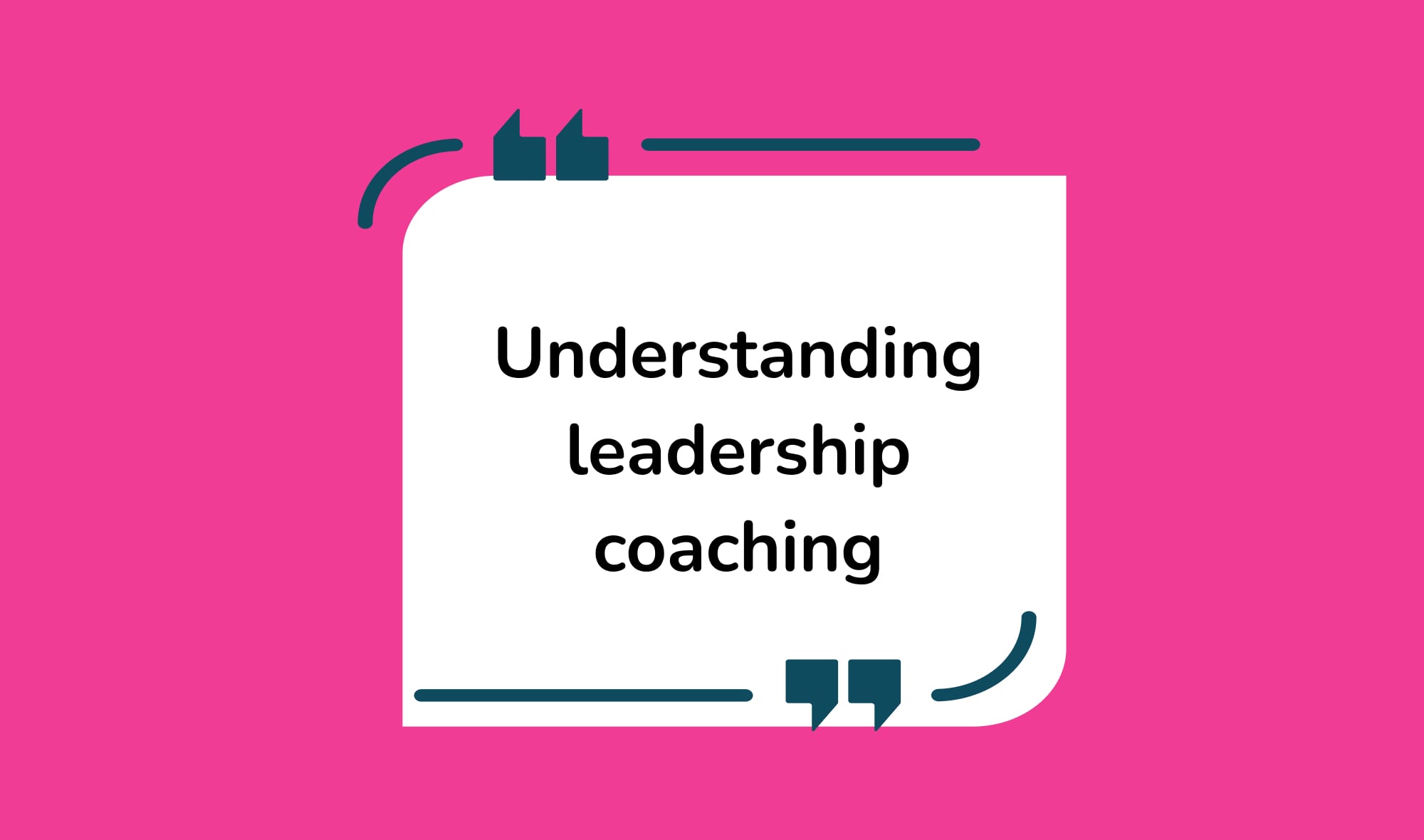The art of coaching a leader: best practices and strategies for today's workplace
By Julian Lewis • April 24, 2023

In today's rapidly changing and complex work environment, effective leadership has become more critical than ever before. As a result, coaching has become an increasingly popular way to develop leaders at all levels. Coaching is no longer reserved for struggling employees or remedial training but has evolved into a valuable tool for supporting high-potential leaders in reaching their full potential.
Among the many types of coaching, over the past few years, leadership coaching has gained popularity in successful corporations across the country, and for a good reason. Coaching helps leaders develop self-awareness, enhance their communication skills, and improve their ability to lead and inspire their teams. In this blog post, we will explore the art of coaching a leader and share best practices and strategies that can help coaches and leaders achieve their goals.
Understanding leadership coaching

Business coaching is a professional development practice designed to help individuals and organizations achieve their goals. Business coaches work with individuals, usually leaders or executives, to help them improve their performance and reach their potential. Coaching is often used to address specific business challenges, such as improving communication skills, enhancing leadership abilities, or overcoming personal obstacles that hinder progress.
The history of business coaching can be traced back to the 1980s when executives and leaders began to realize the benefits of working with a coach to enhance their performance. Initially, coaching was used to help underperforming employees, but over time, coaching has evolved into a valuable tool for personal and professional development for all levels of employees, especially for leaders of high-performing teams.
Coaching, mentoring, and consulting are all similar in that they involve working with an expert in improving performance. However, they differ in their approach and scope (check out Business coach and mentor: what is the difference? for more information). Coaching focuses on helping individuals improve their skills, mindset, and behaviors to achieve their goals. Mentoring involves a more experienced individual guiding and advising a less experienced individual. Consulting provides expert advice and guidance on specific issues, such as strategy or operations, to help organizations achieve their goals.
The benefits of coaching for individual leaders include increased self-awareness, enhanced communication skills, improved leadership abilities, and greater confidence. These benefits can lead to improved job performance, greater job satisfaction, and increased career development and advancement opportunities. Coaching can also benefit organizations by improving employee engagement and retention, increasing productivity, and enhancing organizational culture.
Qualities of a successful coach
A successful coach is a valuable asset to any organization and possesses a range of key coaching skills that enable them to develop employees, help teams grow, and facilitate long-term wins for the organization. These skills include:
An effective coaching leadership style
A successful coach should have an effective coaching leadership style that is focused on helping individuals achieve their goals, both inside or outside the workplace. This leadership style involves providing guidance, support, and feedback to help individuals develop their skills and reach their full potential. Effective coaching leaders should be able to create a safe and supportive environment that encourages learning and growth. They should also be able to provide constructive feedback and help individuals identify and overcome their weaknesses.
A growth mindset
A successful coach should have a growth mindset, which means that they believe in the ability of individuals to develop and improve their skills over time. Coaches who focus their mindset on professional growth are open to new ideas and approaches, and they are willing to experiment and take risks. They are also resilient and able to adapt to changing circumstances.
Strong communication skills
Effective communication is a critical skill for successful coaches. Coaches should be able to listen actively and provide feedback in a clear and concise manner. They should also be able to ask questions that help individuals explore their thoughts and feelings, and they should be able to provide guidance and support that is tailored to the individual's needs.
Emotional intelligence
Successful coaches should have high emotional intelligence, which means that they are able to recognize and understand their own emotions and the emotions of others. They should be able to manage their own emotions and reactions in a way that is constructive and supportive. They should also be able to empathize with others and understand their perspectives.
In addition to these characteristics, successful coaches should have strong problem-solving skills, be able to build trust and rapport with individuals and be able to manage conflict effectively. They should also be knowledgeable about their field and committed to ongoing learning and development. Overall, coaching requires a unique combination of skills and characteristics that enable coaches to help individuals achieve their full potential.
Best practices when coaching leaders

Create a safe and non-judgmental environment
When leaders feel safe and comfortable, they are more likely to open up and share their thoughts, feelings, and challenges. This can lead to a more productive coaching relationship and can help leaders achieve their goals more effectively.
To create a safe and non-judgmental environment, coaches should establish trust and rapport with the leader. This can be done by demonstrating empathy, active listening, and a genuine interest in the leader's goals and challenges. Coaches should also maintain confidentiality and respect the leader's privacy, which can help build trust and create a sense of safety.
Coaches should also adopt a non-judgmental attitude when working with leaders. This is particularly important when coaching first time managers, and means avoiding criticism or judgment and focusing instead on helping the leader identify areas for improvement and develop strategies for achieving their goals. Coaches should also be sensitive to the leader's cultural background and personal experiences, and avoid making assumptions or stereotypes based on these factors.
Check out our ultimate guide to becoming a business coach for more information.
Focus on strengths and building on them
A strengths-based approach involves identifying an individual's natural talents and strengths and helping them develop these strengths into skills that can be used to achieve their goals. By focusing on strengths and key skills, coaches can help individuals develop a sense of confidence and motivation that comes from using their natural abilities to excel in their roles.
When coaching leaders, a strengths-based approach can be particularly effective. Leaders who focus on their strengths are more likely to be engaged in their work, demonstrate greater job satisfaction, and experience higher levels of success. Focusing on strengths can also help leaders develop a more positive outlook on their roles and responsibilities, which can lead to increased job performance and productivity.
Coaches who adopt a strengths-based approach to lead teams should start by helping leaders identify their natural talents and strengths. This can be done through assessments, interviews, and observations. Once strengths have been identified, coaches can help leaders develop these strengths by providing targeted feedback and coaching, encouraging opportunities to apply these strengths, and helping leaders build relationships and networks that support their strengths.
It's also important for coaches to help leaders understand how their strengths can be applied in their roles. This involves helping leaders identify opportunities where their strengths can be used to make a positive impact on their teams and organizations. Coaches can help leaders develop strategies for leveraging their strengths to achieve their goals and overcome challenges.
Use assessments to identify areas for improvement
Assessments can provide valuable insights into an individual's personality, values, work style, and preferences. By using assessments, coaches can gain a deeper understanding of the leader's strengths and areas for development, which can inform the coaching process.
There are a variety of assessments that coaches can use when coaching leaders, including personality assessments, emotional intelligence assessments, and 360-degree feedback assessments. Each assessment can provide unique insights into the leader's strengths and areas for improvement.
Once the coach has gathered information from assessments, they can use this information to create a development plan for the leader. This plan should focus on leveraging the leader's strengths while also addressing areas for improvement.
Set clear goals and objectives
Goals and objectives provide a clear roadmap for the coaching process, and they help the leader stay focused on what they want to achieve. By setting clear goals and objectives, coaches can help leaders achieve meaningful results and make progress toward their desired outcomes.
When setting goals and objectives, coaches should work closely with the leader to identify specific, measurable, achievable, relevant, and time-bound (SMART) goals. These goals should be aligned with the leader's overall vision and should be meaningful and challenging, yet attainable. The goals should also be broken down into smaller, more manageable steps, so the leader can make progress and celebrate small wins along the way.
Once the goals have been established, the coach should help the leader develop a plan for achieving those goals. This plan should include specific actions, timelines, and metrics for measuring progress. The coach should also work with the leader to identify potential obstacles or challenges that may arise and develop strategies for overcoming those obstacles.
Provide feedback and accountability
In order to effectively coach someone, coaches should focus on providing feedback on specific behaviors and actions, rather than personality traits or character flaws. Feedback should be constructive, specific, and timely, and it should be delivered in a supportive and non-judgmental manner. The coach should also work with the individual team member or leader to develop strategies for addressing areas where improvement is needed.
Accountability involves setting clear expectations and commitments and holding the leader accountable for meeting those commitments. A good coach should work with the leader to develop a plan for achieving their goals, including specific actions, timelines, and metrics for measuring progress. The coach should also establish regular check-ins to monitor progress, provide feedback, and adjust the plan as needed.
In addition to providing feedback and accountability, coaches should also model the behaviors and skills they are teaching. This means demonstrating effective communication skills, setting clear expectations, and holding each team member and themselves accountable for their own performance and commitments.
Foster self-reflection and awareness
One way coaches can foster self-reflection and awareness is by asking open-ended questions that encourage leaders to reflect on their thoughts, feelings, and actions. These questions can help managers identify their values, motivations, and goals, and they can also help them recognize patterns in their behavior that may be hindering their progress.
Coaches can also encourage leaders to engage in self-reflection and awareness exercises, such as journaling or mindfulness practices. These exercises can help many leaders develop a greater sense of self-awareness, as well as a deeper understanding of their emotions, thoughts, and behaviors.
In addition to fostering self-reflection and awareness, coaches can also help leaders develop the skills they need to communicate effectively with others. This includes developing individuals' active listening skills, empathy, and the ability to provide feedback and receive feedback in a constructive and non-defensive manner.
Join our Newsletter
Transform your career with our personal growth insights. Get one valuable tip right in your inbox every Saturday morning.
Encourage experimentation and learning
Coaches can encourage experimentation and learning by creating a supportive environment that encourages risk-taking and exploration. Coaches can encourage leaders to try new approaches, experiment with different techniques, and take on new challenges. This can help leaders develop new skills and knowledge, and it can also help them identify areas where they may need further development.
Coaches can also encourage learning by providing opportunities for leaders to engage in ongoing education and development. This can include attending conferences, workshops, and training sessions, as well as reading books, articles, and other materials that are relevant to their work. Coaches can also encourage leaders to seek out mentors or other experts in their field who can provide guidance and support.
Customize coaching to meet individual needs
When it comes to coaching leaders, one size does not fit all. Every leader has unique strengths, challenges, and development needs. Effective coaching requires a customized approach that is tailored to the individual needs of the leader. By customizing your methods and techniques, you can help managers develop their skills, build confidence, and achieve their goals.
For example, new managers may benefit from a command and control approach or directive coaching in the early stages of their leadership journey. This approach can help new leaders establish clear expectations, set boundaries, and establish credibility and a managerial mindset. However, senior managers have likely already established their credibility and leadership style and may benefit more from a coaching style that encourages self-reflection, problem-solving, and continuous growth and development. By shifting to a more collaborative coaching approach, senior managers can be empowered to think more strategically, improve their communication skills, and lead their teams to success.
Ultimately, the most effective coaching style will depend on the individual needs and goals of each coachee, and a skilled coach will be able to adapt their coaching style to meet those needs and achieve success.
Overcoming common coaching challenges

Business coaching is a valuable tool for personal and professional development, but it also comes with its unique set of challenges. These challenges can range from communication barriers and time constraints to resistance to change and lack of clarity on goals. However, with the right skill set and attitude, these challenges can be overcome.
Here are just a few of the most common challenges faced by leadership coaches and suggestions on how to handle them.
Addressing resistance to coaching
Addressing resistance to coaching is a common challenge that coaches may encounter when working with leaders. Resistance to coaching can arise for a variety of reasons, including a lack of trust, a perceived lack of value, or a reluctance to change. However, it is possible to overcome resistance to coaching by adopting a proactive and flexible approach.
One way to address resistance to coaching is to start by building trust and rapport with the leader. This can be done by actively listening to the leader's concerns and addressing them in a non-judgmental manner. Coaches should also be transparent about their coaching approach and the benefits of coaching for the leader and the organization.
Coaches can also address resistance to coaching by tailoring their approach to the leader's needs and preferences. This means taking into account the leader's learning, style of leadership, communication style, and personal goals and objectives. By customizing the coaching approach, coaches can increase the relevance and value of the coaching experience for the leader.
Another way to address resistance to coaching is to engage the leader in the coaching process. Coaches can encourage the leader to take ownership of the coaching process by setting goals, identifying areas for improvement, and developing strategies for achieving those goals. By involving the leader in the coaching process, coaches can increase their buy-in and commitment to the coaching experience.
Managing time constraints
Leaders are often busy and may have limited time to devote to coaching, which can make it challenging to develop a productive coaching relationship. However, by adopting a proactive and flexible approach, coaches can overcome time constraints and help leaders achieve their goals.
One way to manage time constraints is to establish clear goals and objectives for the coaching process. By defining specific goals and objectives, coaches can help leaders stay focused on what they want to achieve and prioritize their time accordingly. Coaches can also break down the coaching process into smaller, more manageable steps, so leaders can make progress even if they have limited time available.
Another way to manage time constraints is to tailor the coaching approach to the leader's schedule and preferences. Coaches can work with leaders to identify the best times and methods for coaching sessions, such as in-person meetings, video conferences, or phone calls. Coaches can also provide coaching materials and resources that leaders can access on their own time, such as books, articles, or videos.
Coaches can also help leaders manage their time more effectively by providing guidance and support around time management skills. Coaches can help leaders develop strategies for prioritizing tasks, managing their schedules, and delegating responsibilities. By improving their time management skills, leaders can make more time available for coaching and other important activities.
If you're interested in practical examples of leadership feedback, check out this insightful post on leadership feedback examples.
Dealing with difficult personalities
Difficult personalities can present a variety of challenges, including resistance to a coaching or management style, negative attitudes, and interpersonal conflicts. However, by adopting a proactive and flexible approach, coaches can overcome difficult personalities and help leaders achieve their goals.
One approach for dealing with difficult personalities is to provide them with constructive criticism and feedback in a non-threatening and supportive manner. Coaches should focus on the leader's behavior, rather than their personality, and provide specific examples to illustrate their points. Coaches should also work with the leader to develop strategies for improving their behavior and addressing any issues that may be hindering their progress.
Conclusion
In today's ever-changing workplace, investing in a strong, diverse leadership team and employee development is more important than ever. Effective coaching can be a powerful tool for developing leadership skills, from first-time managers to senior executives. By implementing best practices and strategies for coaching leaders, organizations can drive success by cultivating a company culture of growth and development.
Coaching not only helps leaders improve their skills but also enhances individual team members' performance, builds morale, and fosters a sense of ownership and accountability among team members. For insights on identifying and correcting negative workplace culture, read our blog post on Building a Better Business: How to Identify and Correct Negative Workplace Culture.
The art of coaching a leader requires a deep understanding of their unique strengths and challenges, as well as the ability to tailor coaching to their individual needs. By investing in coaching for their leadership team, organizations can create a sustainable competitive advantage that drives growth, innovation, and long-term success for years to come.
For more on this topic, check out:
Join our Newsletter
Transform your career with our personal growth insights. Get one valuable tip right in your inbox every Saturday morning.
Read more about: Executive Coaching
About Julian Lewis
Julian Lewis is a driven and accomplished professional with a passion for driving positive change in the business world. He is the co-founder and COO at Zella Life.
His own experience as a professional of color in a Fortune 500 company led him to discover the limitations for advancement that many professionals like himself face. Determined to reach his full potential, Julian became an established business coach and entrepreneur, committed to supporting others in their pursuit of personal and professional growth.
Today, Julian is a recognized corporate trainer, coach, and leader, known for his ability to leverage real-life experiences and evidence-based methodologies to affect positive change within individuals and organizations. As the leader of Zella Life's coaching division, he is dedicated to empowering individuals and businesses to achieve their full potential.